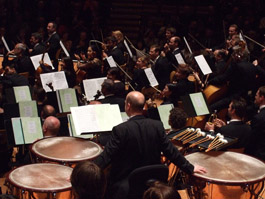
A concert hall could be built on Štvanice, a project is being developed
 |
"We are the initiators of turning the old Štvanice into a new one. The question is how developers and the hockey federation will view this. The building is deteriorating, and the location is so wonderful that it would be worth bringing it to completion," Hasenöhrl said today, who allegedly has already discussed it with Mayor Pavel Bém. The head of ČNSO claims that the plans are in the early stages and this is just an idea.
Bém would likely approve of the idea of building a new concert hall. If such a project materialized, Prague would definitely support it, the mayor responded to ČTK's inquiry. The necessity of a new concert hall has been discussed since the 1960s.
The land on Štvanice belongs to the city and the winter stadium was declared a cultural monument nine years ago, having been built in 1935. City hall officials are very cautious about changes on Štvanice. The construction would be located in an area highly threatened by floods and would need to obtain a number of permits that would require meeting strict conditions. "If I'm not mistaken, this is so-called an active zone, where they won't allow even a fence to be built," stated Jiří Chour, head of the building department in Prague 7, who cannot imagine that any construction would meet the conditions.
In the eastern part of Štvanice, a territorial decision was issued in September allowing partial modifications for the creation of a playground, sports facilities, sidewalks, and parking spaces. However, discussions about the regeneration of the island have been going on for a long time.
The new concert hall would also be supported by chief conductor Jiří Kout of the Prague Symphony Orchestra and other personalities from the music industry. "I think it's a shame; such a hall should have been here a long time ago. I would envision involving some wonderful acoustician in its preparation," Kout stated.
In Prague, a new concert hall could have been built in Letná already in the mid-1990s. Japanese investors wanted to donate one to the Czech Philharmonic for its centenary in 1996. The project was prepared, but Czech politicians ultimately rejected the plan. The visions of utilizing the former barracks in the Republic Square, where another shopping center stands, have not materialized either.
Modern concert halls are being built in European cities such as Munich, Cologne, Leipzig, or Luxembourg, as well as in Japan and America. The last concert hall for classical music built in the Czech capital was the Smetana Hall in 1912. It offers 1,100 seats, but critics point out that its acoustics, uncomfortable seats, and poor visibility of the stage from the back rows are disadvantages. The Dvořák Hall has been serving its purpose since 1885 and also accommodates around 1,100 listeners. It includes a fully equipped recording studio. However, with a large orchestral presence, it reaches an unacceptable volume. It also does not provide enough legroom, and during intermissions, the hallways tend to be overcrowded.
What should the ideal concert hall offer?
- a capacity of around 2000 seats
- natural acoustics suitable for solo instruments, vocals, and large symphonic ensembles
- two to three smaller halls for chamber music
- facilities for orchestras and choirs
- comfortable "third generation" seating
- excellent visibility from all seats in the hall
- the ability to host amplified concerts, which are not possible in the Rudolfinum or the Municipal House
- function as a recording studio with natural acoustics as well as a cultural center for diverse cultural activities
The English translation is powered by AI tool. Switch to Czech to view the original text source.
0 comments
add comment
Related articles
0
30.05.2011 | Due to the demolition of Štvanice, councilor Udženija faces a criminal complaint
1
28.05.2011 | In Prague, the demolition of the ice rink in Štvanice began today
0
28.05.2011 | The winter stadium on Štvanice has served sports and entertainment since 1932
1
13.05.2011 | The fate of the winter stadium on Štvanice is still unclear
0
17.01.2011 | Heritage conservationists will initiate administrative proceedings against Prague due to Štvanice






